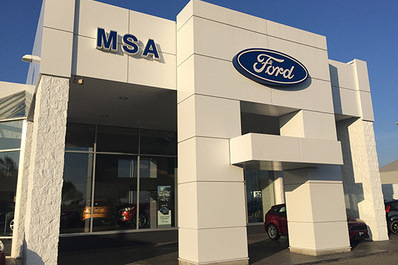Ford Dealership Services: A Detailed Breakdown
What specific services does a Ford service include provided by a dealership? These services and features collectively contribute to a comprehensive and customer-focused Ford service experience aimed at ensuring Ford vehicles’ performance, safety, and longevity while prioritizing customer satisfaction and convenience. How often should Ford vehicles typically undergo scheduled maintenance? Ford vehicles typically undergo scheduled … Continued
What specific services does a Ford service include provided by a dealership?
- Scheduled Maintenance: Ford dealerships provide comprehensive scheduled maintenance services, including oil changes, filter replacements, fluid checks, and tire rotations based on the manufacturer’s recommended service intervals.
- Diagnostic Services: Dealerships offer advanced diagnostic tools and equipment to identify and address potential issues with the vehicle’s engine, transmission, electrical systems, and other components.
- Genuine Ford Parts and Accessories: Ford dealerships use genuine Ford parts and accessories to ensure quality and compatibility, maintaining the vehicle’s performance and integrity.
- Warranty Repairs: Ford dealerships are authorized to perform warranty repairs, addressing any covered issues according to the manufacturer’s warranty terms.
- Recall and Service Campaigns: Dealerships address any open recalls or service campaigns, ensuring that the vehicle is up to date with the latest safety and performance enhancements.
- Expert Technicians: Ford dealerships employ certified technicians who work specifically with Ford vehicles, ensuring expertise and familiarity with the brand’s technology and engineering.
- Vehicle Inspections: Dealerships conduct comprehensive vehicle inspections to identify potential maintenance needs and provide recommendations for addressing any issues.
- Advanced Equipment and Tools: Ford dealerships have state-of-the-art tools and diagnostic equipment to perform accurate and efficient maintenance and repairs.
- Customer Amenities: Many Ford dealerships offer customer amenities such as comfortable waiting areas, complimentary refreshments, and shuttle services for convenient customer experiences.
- Service Specials and Incentives: Ford dealerships may offer service specials, maintenance packages, and incentives to help customers save on routine maintenance and repairs.
- Online Scheduling and Communication: Some Ford dealerships provide online scheduling tools and digital communication channels, allowing customers to schedule service appointments easily and receive updates on their vehicle’s status.
- Customer Education and Support: Dealership service advisors offer guidance and education on vehicle maintenance, service recommendations, and technology features to empower customers with knowledge about their Ford vehicles.
These services and features collectively contribute to a comprehensive and customer-focused Ford service experience aimed at ensuring Ford vehicles’ performance, safety, and longevity while prioritizing customer satisfaction and convenience.

How often should Ford vehicles typically undergo scheduled maintenance?
Ford vehicles typically undergo scheduled maintenance at regular intervals, outlined in the owner’s manual and can vary based on the specific model, year, and driving conditions. However, as a general guideline, Ford recommends following their standard maintenance schedule, which often includes the following intervals:
Oil Changes: Ford typically recommends oil changes every 12,000 to 16,000 kilometres or every 6 to 12 months, depending on the vehicle model and engine type.
- Tire Rotations: Tire rotations are typically recommended every 8,000 to 12,000 kilometres to ensure even tire wear and optimal performance.
- Fluid Checks and Replacements: Periodic checks and replacements of essential fluids such as coolant, brake fluid, transmission fluid, and power steering fluid should happen at specific kilometre intervals.
- Filter Replacements: Air filters, cabin air filters, and fuel filters may need to be replaced at recommended intervals to maintain optimal engine performance and air quality.
- Brake Inspections: Ford recommends regular brake inspections to ensure safe and reliable braking performance.
- Scheduled Inspections: Scheduled inspections for components such as belts, hoses, suspension, and exhaust systems should happen at specific kilometre intervals.
It’s important for Ford vehicle owners to consult their specific owner’s manual or reach out to an authorized Ford dealership or service center to ensure that their vehicle’s maintenance schedule aligns with the manufacturer’s recommendations. Additionally, factors such as driving habits, environmental conditions, and individual vehicle usage can also influence the frequency of maintenance needs.
Are there any specific maintenance recommendations for Ford hybrid or electric vehicles?
Yes, Ford hybrid and electric vehicles have specific maintenance recommendations to ensure their efficient and reliable performance. Here are some common maintenance considerations for Ford hybrid and electric vehicles:
- Battery System Maintenance: Regular inspection and maintenance of the high-voltage battery system is essential for hybrid and electric vehicles, including checking the battery’s health, cooling system and ensuring proper insulation and safety protocols are in place.
- Electric Motor and Drive System: Periodic inspection and maintenance of the electric motor and drive system are necessary to ensure efficient power delivery and overall vehicle performance.
- Regenerative Braking System: Maintenance of the regenerative braking system, which helps recharge the hybrid or electric vehicle’s battery during deceleration, is important to ensure optimal braking performance and energy regeneration.
- Charging System Inspection: For electric vehicles, regular inspection of the charging system, including the charging port, onboard charger, and associated components, is crucial to maintain proper charging functionality.
- Software Updates: Keeping the vehicle’s software up to date is essential for hybrid and electric vehicles, as software updates can optimize performance, address potential issues, and enhance overall efficiency.
- Electric Vehicle (EV) Battery Health Monitoring: Some Ford electric vehicles may have systems in place to monitor the health and performance of the EV battery. Regular monitoring and diagnostics of the battery system can ensure long-term reliability and efficiency.
It’s vital for owners of Ford hybrid and electric vehicles to refer to their vehicle’s specific maintenance schedule outlined in the owner’s manual and consult with authorized Ford dealerships or service centers for tailored maintenance recommendations and services specific to hybrid and electric vehicle technology.
Ford News at:
Ford Explorer: Engine Options And Performance Capabilities
Maintenance Intervals: F-650/F-750 Power Stroke® Diesel


